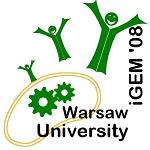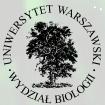IGEM:UW: Difference between revisions
No edit summary |
No edit summary |
||
| Line 28: | Line 28: | ||
*[[User:Piotr Przanowski | Piotr Przanowski]] | *[[User:Piotr Przanowski | Piotr Przanowski]] | ||
*Ewa Szczęsna | *Ewa Szczęsna | ||
*[ [User:Bartosz Zapisek | Bartosz Zapisek | *[[User:Bartosz Zapisek | Bartosz Zapisek]] | ||
== Project Supervisor == | == Project Supervisor == | ||
Revision as of 11:08, 19 June 2008

 University of Warsaw IGEM 2008 page
University of Warsaw IGEM 2008 page
Welcome to University of Warsaw IGEM group page for year 2008
Our Sponsors
 Faculty of Biology, University of Warsaw
Faculty of Biology, University of Warsaw
Warsaw University Consultative Council for Students' Scientific Movement
Team Members
- Łukasz Banasiak
- Paweł Krawczyk
- Michał Krzysztoń
- Kamil Lipiński
- Michał Lower
- Marcin Piechocki
- Weronika Prusisz
- Piotr Przanowski
- Ewa Szczęsna
- Bartosz Zapisek
Project Supervisor
- prof. Jacek Bielecki
- dr. Radoslaw Stachowiak
Our Project
Monoclonal Antibodies
Monoclonal antibodies are proteins produced by cells of the immune system for defense against pathogens. Because of high target recognition specificity antibodies are object of research in many laboratories and pharmaceutical companies around the world. Currently exist numerous therapies based on monoclonal antibodies for diseases such as cancer, allergy, viral infections and autoimmunological diseases. Antibodies are also important research tool used to identify various chemical and biological particles.
Antibody producing GEM
Our research project is divided in three basic stages:
- In stage 1 we will introduce mechanism of targeted increase of genetical variability in regions of bacterial genome encoding antibodies. In this situation every bacterial cell in population will express different antibody on its surface.
- Goal of stage 2 is to provide selection mechanism, which will cause survival of the cells only when expressed antibody binds with target protein. Selection mechanism is based on antibiotic resistance induced by binding of target protein to antibody on cell surface.
- In stage 3 cellular metabolism will be switched to efficient antibody production and export.
Antibody will be then purified from culture medium. At all stages we have planed various control experiments, which will allow us to determine our progress.
This is very simplified description of our ‘biological machine’. Success of our project would allow simple, fast and cheap production of antibodies with desired specificity.
